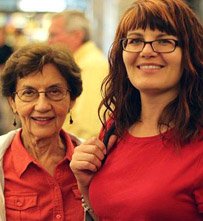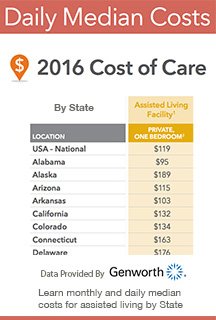Alzheimer's Disease Warning Signs

Summary : It is estimated that there are currently 5 million people in the US living with Alzheimer’s disease. Unfortunately, many people view this disease as simply being a normal part of the aging process. This misconception highlights our collective misunderstanding of this fatal and progressive disease including warning signs. There is no cure, and today it is the seventh-leading cause of death in the United States [1].
What is it like having Alzheimer’s?
I’ve included this powerful video at the top of our page on Alzheimer’s, as it so candidly represents what it is like to be in the earlier stages of Alzheimer’s. This video shows ‘a day in the life’ of Manville Jennings, a relatively younger ‘senior’ who has been recently diagnosed with Alzheimer’s.
What is Alzheimer’s?
Ten Warning Signs Of Alzheimer’s
An excellent, short video by the Alzheimer’s Association of California & Nevada: Question and Answer: Biomarkers and Diagnosis for Alzheimer’s
There are ten warning signs of Alzheimer’s disease. Along with the advice of a doctor, these signs are critical to detecting Alzheimer’s Disease
1) Memory Loss – Forgetting recently learned information is one of the most common early signs. However, it is considered normal for a person to forget names or appointments occasionally, so a distinction needs to be made between what is normal and what is becoming a more frequent trend of forgetfulness.
2) Difficulty performing familiar tasks – Forgetting the steps involved with preparing a meal, or forgetting how to do everyday tasks, like dialing phone number. However, it is usually considered normal for a person to occasionally ‘lose their train of thought’ or forget what you planned to say.
3) Problems with language – People affected by Alzheimer’s may forget simple words and may try to replace them with unusual words.
4) Disorientation to time and place – People with Alzheimer’s may go out for a walk in their own neighborhood and get lost a block from their house.
5) Poor or decreased judgment – People with Alzheimer’s may go out into the freezing cold with very little clothing on, or may become very bad at managing their money. Alzheimer’s sufferers often give away their money to strangers or telemarketers.
6) Problems with abstract thinking – Alzheimer’s sufferers may not be able to do math or use numbers like the once could. Things like balancing a checkbook may become very difficult or impossible.
7) Misplacing things – People with Alzheimer’s may put items in inappropriate places. They may put their wallet or purse in the freezer, or a bracelet in the toaster.
8) Changes in mood or behavior – Alzheimer’s sufferers may show rapid and obvious mood swings. However, everyone’s moods can change from one day to the next, and as we get older, so a distinction may be hard to make.
9) Changes in personality – Alzheimer’s sufferers may become extremely confused, suspicious, fearful or dependent on a family member.
10) Loss of initiative – Alzheimer’s sufferers may become extremely passive and lose interest in previous passions or hobbies.
[Video] Alzheimer’s Disease – The effects of Alzheimer’s disease on the brain. More about the warning signs of Alzheimer’s here
Update – January 17, 2013 – We’d like to add this wonderful video describing the differences between Alzheimer’s and Dementia:
Find An Alzheimer’s Care Facility

Assisted Living Directory works with qualified, experienced care advisors that can help you to find Alzheimer’s/Memory Care in any area of the US. This service is at no cost. If you are looking for memory care for a loved one, and have questions, we encourage you to give us a try. We’ve helped 1000’s of families!
/Assisted Living Directory has helped 1000’s of families (including our own!) to connect with great care facilities!
The First Time I Learned About Alzheimer’s
I remember a neighbor growing up who lived just down the street from me. He was an elderly gentleman, but he was always doing interesting things. He was an ex-army fellow, so he was neat, particular, and organized. He had a wood shop in his garage, and was always building something beautiful with wood. Every day you could hear the buzzing of his saws and the whirring of his drills.
Every day like clockwork, “Mr. Parker” would go for a walk. “Mr. Parker” had an adorable puppy that would tag along, and every day they would take the same route past our house, up into the woods behind the cul-de-sac we lived on, and then he would return in about an hour. My friends and I would always be playing in the street as he walked by. “Mr. Parker” never failed to say “Hello David” with a smile.
I remember that as time went on, I noticed less noise coming out of his wood shop. I though that he was probably just busy, and didn’t have time for it. I also noticed that his walks were not every day any more. Sometimes when I did see him, he seemed not quite as happy, and somewhat disheveled. He used to say “Hi David” when he walked by, it was now “Hello” with not much enthusiasm.
Not much later, I realized that I hadn’t seen “Mr. Parker” in several months. I started to wonder how he was. I didn’t think much of it. I soon learned that “Mr. Parker” had gone out for a walk one day and didn’t return. He got lost on a route that he had done every day for years. When he was found, confused and scared, he was taken to a doctor. He learned that he had Alzheimer’s disease.
That was the first time I had learned about this horrible illness – as a kid relating to an elderly neighbor. The most striking thing to me was the abrupt change in schedule – after all, this was an obsessively organized ex-army officer. Once I learned more about the disease, the symptoms he displayed were all too obvious. Unfortunately, they weren’t obvious to him or those who knew him best. – by The Staff at Assisted Living Directory
Alzheimer’s Association Education Video
Learn all about Alzheimer’s Disease
Do you know the 10 warning signs of Alzheimer’s Disease? Are you aware of the plight of caregivers — the friends and loved ones who care for Alzheimer’s patients? These topics, as well as personal stories about Alzheimer’s disease are covered in this wonderful presentation.
“Forgetful Not Forgotten”
There have been times during the development of Assisted Living Directory that I will come across a site that grabs my attention and won’t let go. Forgetful not Forgotten is just such a site.
Forgetful not Forgotten is a web community focused on education and resources, and they regularly add new feature content that is based on the advice of experts in the fields of social work, long term care, and aging.
However, what really grabbed me, and touched me about this site is the film by Chris Wynn – a very moving and honest chronicle of his father’s battle with Alzheimer’s and the impact it had on his family.
The film really dives into the non-medical aspects of the disease, and the impact it made on the family, as well as Chris’s mother, the primary caregiver.
I have not seen the entire film – however, there are a number of long trailers and video clips on FNF’s site, as well as on You tube that are as powerful as I can imagine the full feature would be.
I hope that someday I will have the opportunity to see the film in it’s entirety.
The Rubina
It is quite rare nowadays to come across a website that truly impresses me with outstanding content. I was thrilled to find such as site that talks about a wide range of aging issues, including an in-depth section about Alzheimer’s. The Rubina is just such a site.
Harold and Allan Rubin have carefully constructed over 400 thorough articles, of which Alzheimer’s disease is a common subject. Topics range anywhere from the “Implications of longer life with AD” to studying the link between insulin levels and memory.
I encourage anyone interested in really learning more about Alzheimer’s Disease, Assisted Living, or just about any other aging-related topic to check out this marvelous site. The Rubina site is an important source of a wide range of information that could prove helpful to individuals dealing with issues of aging.
Alzhiemer’s Myths
MYTH: Alzheimer’s disease is only something older people get. THE TRUTH: Alzheimer’s can affect people in their 30’s. Did you know that over a half million people in the US under the age of 65 have Alzheimer’s or related dementia?
I have heard the phrase “Midz-heimer’s Disease” used jokingly to describe middle-aged people who are forgetful. Unfortunately, this phrase has more truth to it than most people realize.
The Long Goodbye
If you would like to read a very heartfelt, and first-hand account about being a caregiver for a loved one who has Alzheimer’s, please visit The Long Goodbye. James Bianco’s site is about his wife, Barbara, was diagnosed with Alzheimer’s Disease in May, 1997. She was only 55 years old. James was forced to give up his business to become a full-time caregiver to his wife. Jame’s site is touching, informative, and a great resource to learn more about this terrible disease.
Community Support
No Obligation
Assisted Living with Alzheimer's Disease Warning Signs




